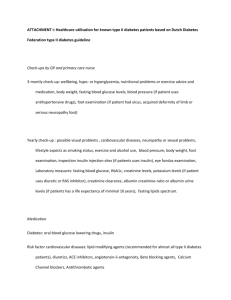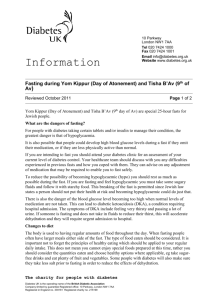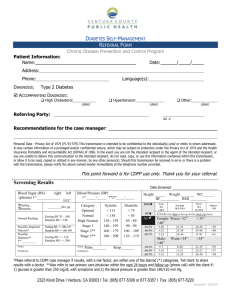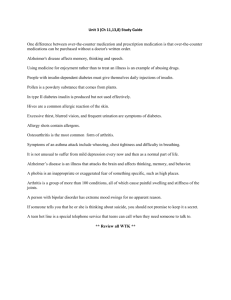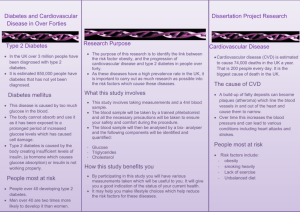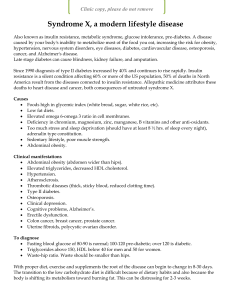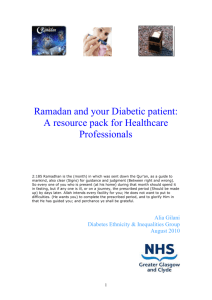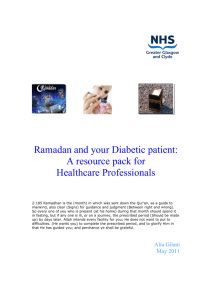Diabetes Ramadan Guidelines 2009
advertisement
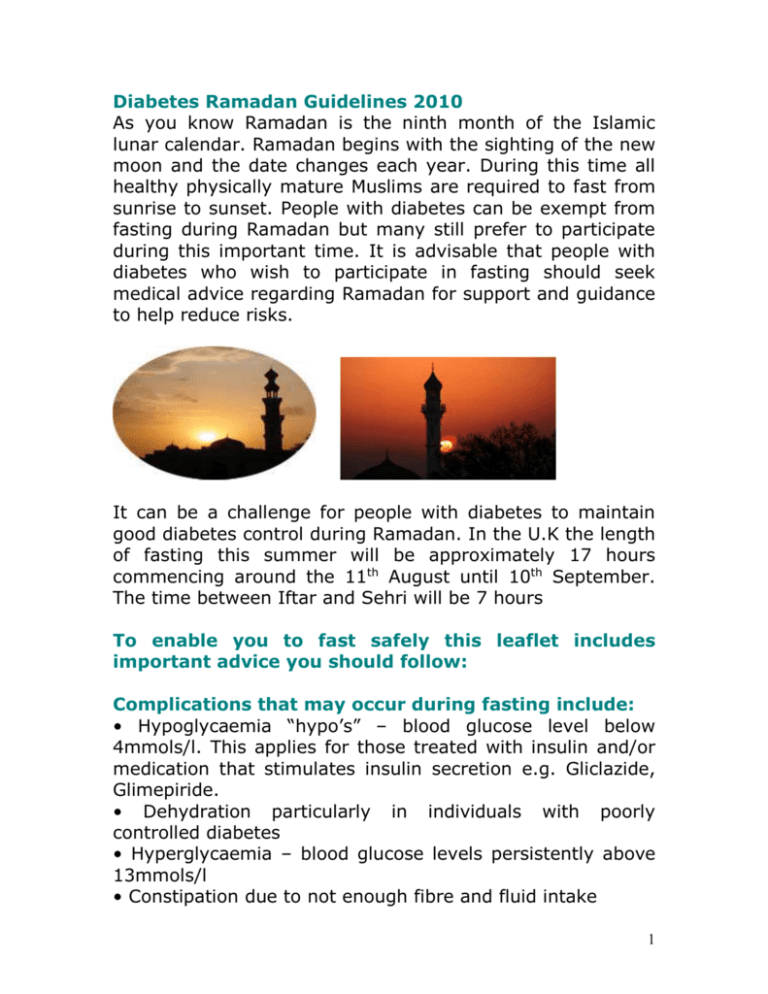
Diabetes Ramadan Guidelines 2010 As you know Ramadan is the ninth month of the Islamic lunar calendar. Ramadan begins with the sighting of the new moon and the date changes each year. During this time all healthy physically mature Muslims are required to fast from sunrise to sunset. People with diabetes can be exempt from fasting during Ramadan but many still prefer to participate during this important time. It is advisable that people with diabetes who wish to participate in fasting should seek medical advice regarding Ramadan for support and guidance to help reduce risks. It can be a challenge for people with diabetes to maintain good diabetes control during Ramadan. In the U.K the length of fasting this summer will be approximately 17 hours commencing around the 11th August until 10th September. The time between Iftar and Sehri will be 7 hours To enable you to fast safely this leaflet includes important advice you should follow: Complications that may occur during fasting include: • Hypoglycaemia “hypo’s” – blood glucose level below 4mmols/l. This applies for those treated with insulin and/or medication that stimulates insulin secretion e.g. Gliclazide, Glimepiride. • Dehydration particularly in individuals with poorly controlled diabetes • Hyperglycaemia – blood glucose levels persistently above 13mmols/l • Constipation due to not enough fibre and fluid intake 1 • Indigestion from over indulgence of fried and spicy foods The following factors increase the risk of complications from fasting: • Type 1 diabetes with unstable diabetes control • Type 1 and type 2 diabetes with poor diabetes control • People with kidney impairment as there is a risk of dehydration and deterioration of kidney function • People who have reduced awareness of hypoglycaemia or frequent hypos • People with Type 1 diabetes who have had a recent ketoacidosis event • Women who are pregnant or breastfeeding these women are strongly advised not to fast. You may be advised against fasting if any of the above applies. Recommendations for Fasting Your diabetes control is still important during Ramadan and your blood glucose levels need to be near to normal as possible. As a general guide it is recommended that:• Breakfast (Sehri) is eaten sometime before dawn or 1-2 hours before dawn. A good choice for breakfast would be perhaps a high fibre or oat based cereals, granary or whole meal toast and fruit with yoghurt. • The fast is usually broken (Iftar) with snacks such as 1-3 dates and water with the meal consumed shortly after Sunset. 2 As the fast this year will be longer and broken later in the evening, try to break the fast with foods that have a lower glycaemic index (GI) such as fruit, yoghurt, chick peas, lentils, with smaller portions of rice or chappati with your meal Foods which are high in fibre such as wholemeal bread, cereals and fruit are more filling and will help promote good bowel health. Asian sweets are also high in calories and so people with diabetes should eat small amounts of these, or only as a special treat. Foods which are fried such as pakoras or samosas should be consumed only in small amounts as a treat Try to drink plenty of clear fluids such as water, sugar free squashes or diet drinks. Use sweetener in tea and coffee if required to prevent dehydration. Medication ORAL HYPOGLYCAEMIC AGENTS such as Metformin or Acarbose These medications do not cause people to experience Hypoglycaemia or “hypos” so no change to this medication is required. It is recommended that these tablets should be taken with food therefore when a person is fasting it is advisable to miss the dose at lunchtime when not eating. 3 Once Ramadan and your fast is over you should go back to your normal doses as before. Thiazolidinediones (Glitazones) No changes will need to be made to glitazone treatment as it is usually only a once or twice daily regime. These medications do not cause hypoglycaemia unless they are taken with insulin or tablets called sulphonylureas (such as Gliclazide) or prandial glucose regulators (such as Nataglinide) and it is those treatments that will need adjustment if hypoglycaemia is a risk or problem. Sulphonylureas (Glimepiride Gliclazide) Medications such as Gliclazide or Glimepiride are drugs for diabetes which can cause hypoglycaemia. Care as to when and how they are taken, needs to be planned for when fasting. Problems such as Hypoglycaemia related to these tablets can be avoided by making changes such as Glimepiride taken once daily when the fast is broken during the month of Ramadan Gliclazide if you normally take 2 tablets morning and evening take only one tablet in the morning during fasting for Ramadan. If you take two tablets in the evening continue as normal. 4 If you take one tablet morning and one tablet evening no change required Longer acting tablets such as Glibenclamide must be changed see your GP or Nurse to switch to a more suitable tablet prior to Ramadan. This will be a permanent change. If you find you are still experiencing hypo events during Ramadan you may need to talk to your diabetes team. Further dose reductions may be needed. Gliptins tablets such as Sitagliptin, Vildagliptin or Saxagliptin No change required These tablets are once daily preparations and taken more commonly with other oral medications for diabetes and are less commonly associated with Hypoglycaemia. Insulin Therapy Individual advice is important if you plan on fasting for Ramadan and are taking insulin therapy with or without tablets for your diabetes. Contact your health care professional for specific advice, but the following general guidelines may help to prevent problems. One injection per day 5 If taking a once daily injection of long acting insulin such as Lantus or Levimir no need to change the dose unless you find after - fasting for a few days you are experiencing hypos, if this is the case it would be advisable to reduce your dose by 2-4 units during fasting period. It would then need to be increased after Ramadan finishes. Two injections per day If taking twice daily injections of a mix 30, mix 25 or mix 50 insulin the change depends on the amount of insulin injections you take - for example, if you take 40 units before breakfast and 32 units before evening meal it would help to reverse the injections during fasting, i.e.: take 32 units before breakfast and 40 units before evening meal. If you are taking the same amounts with both meals the Sehri (morning) dose will need to be reduced by about 30% e.g. 50 units would be reduced to 35 units. However the Sehri dose may require further reduction if you experience low blood glucose levels during the day. Remembering to go back to your normal doses after Ramadan finishes. Three injections per day If you are on a three times daily mix you would need to miss out the lunchtime dose and follow the above instructions remembering to go back to your normal doses after Ramadan finishes. Four injections per day If you are on a basal bolus or 4 injections per day you would need to take your long acting insulin as normal or at the same time as when breaking the fast. Take your rapid acting insulin only when you eat, if your meal is higher in carbohydrates than normal you may need to increase this dose. One way to check if you have given the correct amount is to test 2 hours after 6 eating. If your result is under 10mmol/l you have estimated correctly. Exenatide (Byetta) This treatment by injection for your diabetes is unlikely to cause Hypoglycaemia unless taken with Sulphonylurea such as Glimepiride which may cause hypos. There is no need to change the injection as it is a fixed dose but it is important that it is given before food and there is 6 hours between the 2 injections. Checking your blood glucose levels It is important to check your blood glucose levels during fasting especially if you feel unwell or think you may be hypo, it is not breaking your fast as you are not putting anything into your body to break the fast. If you have hypo symptoms or your blood glucose level is below 4mmol/l you must break your fast it is important to treat a hypo should it occur during your fast with the correct amount of glucose. Patient information leaflets are available from your practice nurse or diabetes team to help with your diet or hypoglycaemic events. Liraglutide (Victoza) This treatment by injection for your diabetes is unlikely to cause Hypoglycaemia unless taken with Sulphonylurea such as Glimepiride which may cause hypos. There is no need to change the injection as it is a fixed dose. However this injection may normally be given during the time you are 7 fasting. Taking your injection as normal will not be breaking the fast. But if you are not happy to take the injection whilst fasting it should be taken when you break the fast. Hypoglycaemia Symptoms Tingling hands, feet, lips tongue Sweating Dizziness Trembling Hunger Blurred vision Difficulty in concentration Palpitations Occasional headaches Any blood glucose (sugar) or level under 4mmol/l should be treated with Glucose such as Lucozade or a small glass of any sugary pop or 3-4 glucose tablets or jelly babies. This will work to bring your blood glucose levels back up to normal but you may also need a small snack such as fruit, cereal or toast if it is not your meal time. After Ramadan Go back to taking your medication as it was taken before Ramadan started. Check that you are taking the correct dosages of all of your medications. Eid Mubarack Diabetes Team Horton Park Bradford Tel: 0845 111 4002 Review date June 2010 8
